February 1 marks the beginning of Black History Month in the United States. Learn more about this important time, including ways to celebrate and how to explain Black History Month to kids. You can even get a free collection of Black History Month for Kids Google Slides to share with your students!
Jump to:
Black History Month Explanation for Kids
What is Black History Month?
U.S. Public Law 99-244 states that “the observance of Black History Month provides opportunities for our Nation’s public schools, institutions of higher learning, and the public to gain a deeper understanding and knowledge of the many contributions of Black Americans to our country and the world.”
When is Black History Month?
In the United States, Black History Month takes place every year throughout the month of February. It begins with a Presidential Proclamation reflecting on the importance of the observance, as mandated by the original law passed by Congress.
Who created Black History Month?
In 1915, historian and author Dr. Carter G. Woodson founded the Association for the Study of Negro Life and History (now known as ASALH). He wanted to draw attention to neglected events and people important to Black American history. In 1926, he launched “Negro History Week,” offering teachers and public institutions the chance to feature Black history in their schools and communities. Over time, this week grew into a monthlong observance.
How did Black History Month evolve?

In 1976, the event had outgrown a week and was expanded to a full month. It was named Black History Month as the term “Negro” was now considered outdated and offensive. President Gerald Ford issued a proclamation urging every American to “seize the opportunity to honor the too-often neglected accomplishments of Black Americans in every area of endeavor throughout our history.”
Presidents continued this tradition annually every February thereafter. In 1986, Congress passed U.S. Public Law 99-244, making Black History Month a federally recognized event.
Why does Black History Month take place in February?
February includes the birthdays of both Abraham Lincoln and Frederick Douglass, important members of the abolitionist movement in the 19th century. In fact, Black Americans had been celebrating Lincoln’s birthday as a holiday ever since his assassination in 1865. The first Negro History Week took place during the week that included both Lincoln’s and Douglass’ birthdays.
Why is Black History Month important?
Throughout American history, Black people and racial atrocities that happened to them have often been ignored or even suppressed. By taking a month to highlight Black history and culture, historians and educators hope to begin correcting this imbalance. They aspire to help Americans learn from past mistakes and work toward better equality and equity in our country’s future. As the National Museum of African American History states, “Knowing the past opens the door to the future.”
What are the Black History Month colors?

Many posters, graphics, and other Black History Month images use four colors important to African American culture:
- Red: The color of the blood shed in the fight for liberty and equality
- Black: The color of “the noble and distinguished race to which we belong”
- Green: The color of the luxuriant vegetation of Africa, the Motherland
- Yellow: Represents optimism, justice, and equality for everyone
Do other countries celebrate Black History Month?
Some other countries also celebrate Black History Month, including Canada, the United Kingdom, Germany, Panama, The Netherlands, Australia, and Costa Rica. However, they don’t all celebrate during the same month. For instance, the U.K. commemorates the event in October.
What is the Black History Month theme for 2024?
Each year since nearly the beginning, the ASALH has declared a theme to help focus attention on key Black history and culture issues. In 2024, the theme is “African Americans and the Arts.”
How do we celebrate Black History Month?
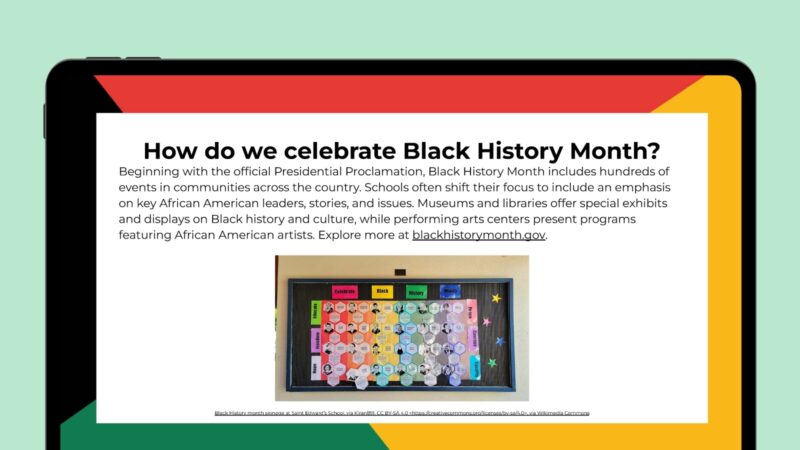
Beginning with the official Presidential Proclamation, Black History Month includes hundreds of events in communities across the country. Schools often shift their focus to include an emphasis on key African American leaders, stories, and issues. Museums and libraries offer special exhibits and displays on Black history and culture, while performing arts centers present programs featuring Black artists. Explore more at blackhistorymonth.gov.
Black History Images To Share With Kids
A picture can be worth a thousand words, and these powerful images are no exception.
Slave Auction Poster
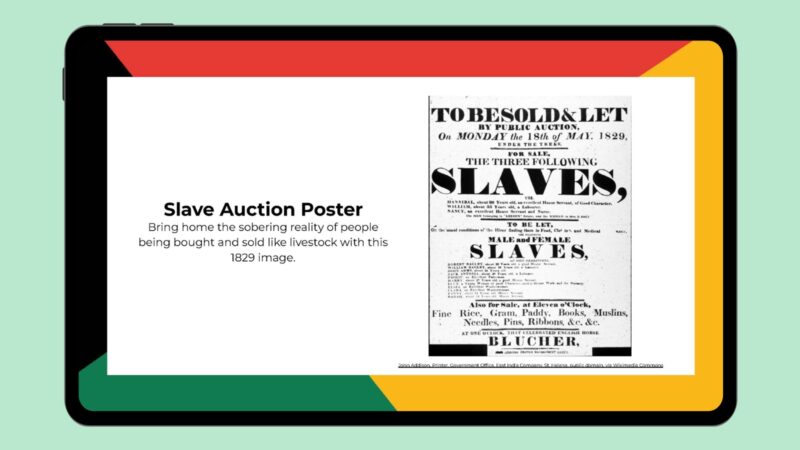
Bring home the sobering reality of people being bought and sold like livestock with this 1829 image.
Harriet Tubman

Hero Harriet Tubman is shown here with a group of formerly enslaved people she helped lead to freedom.
“Vote for Segregation” Postcard

Even after the official ending of slavery, legal segregation and racial discrimination continued, as this 1915 postcard shows.
Segregated Drinking Fountains
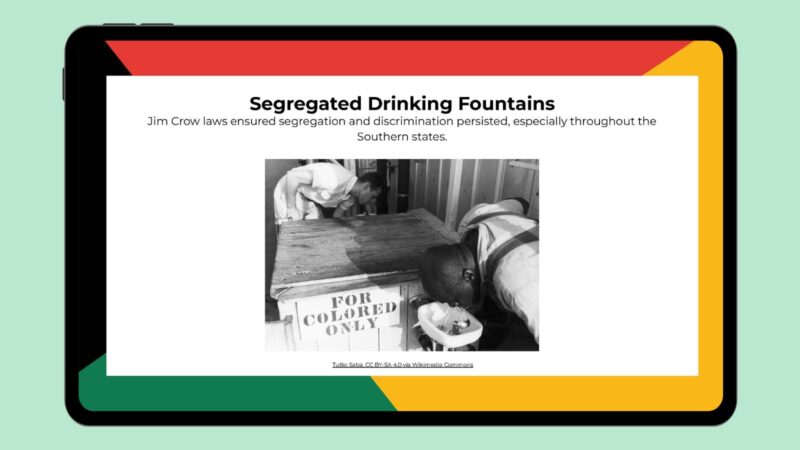
Jim Crow laws ensured segregation and discrimination persisted, especially throughout the Southern states.
Ruby Bridges
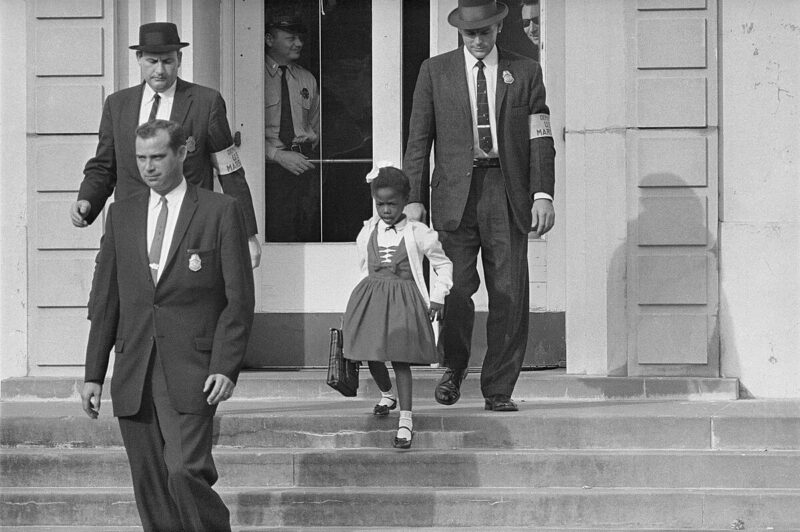
To begin the federally ordered desegregation of schools in the South, 6-year-old Ruby Bridges was escorted into an all-white school by U.S. federal marshals for her safety.
Dr. King at the March on Washington
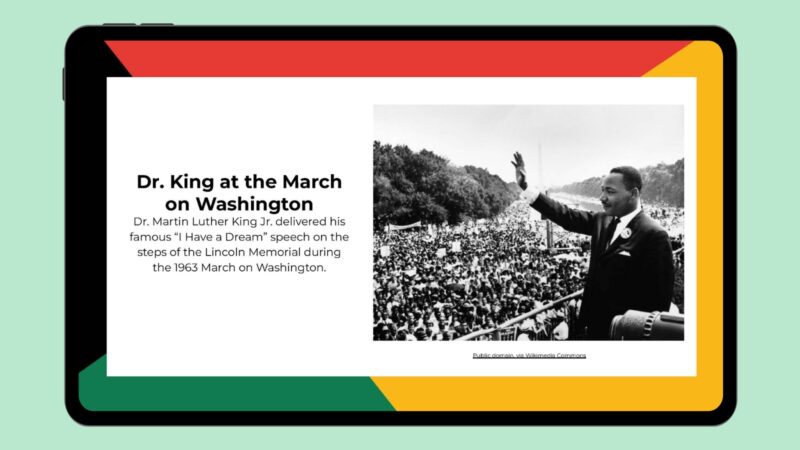
Dr. Martin Luther King Jr. delivered his famous “I Have a Dream” speech on the steps of the Lincoln Memorial during the 1963 March on Washington.
Barack Obama’s Presidential Inauguration

In 2009, Barack Obama became the first Black president of the United States of America.
Black Lives Matter Protest

Throughout the first decades of the 21st century, racial injustice and police brutality led to the creation of the Black Lives Matter movement.
Black History Facts for Kids

Find lots of fascinating facts about important people and events in Black history here:
Books, Poems, Videos, and Movies for Black History Month
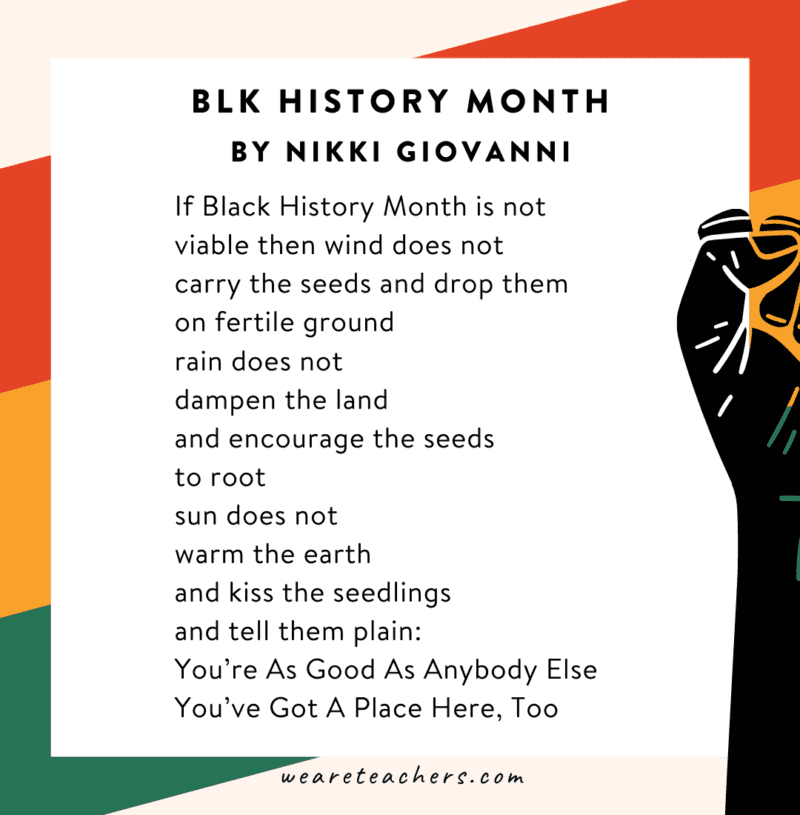
Use these media resources during Black History Month to learn more about African American culture, experiences, stories, and more.
Black History Month Activities and Classroom Resources

Take time each February to focus attention on Black history with these classroom activities and ideas.
Don’t forget to grab your free Black History Month for Kids Google Slides

Just click the button below to fill out the form and get instant access to free downloadable Black History Month for Kids Google Slides featuring all of the information and images on this landing page.

